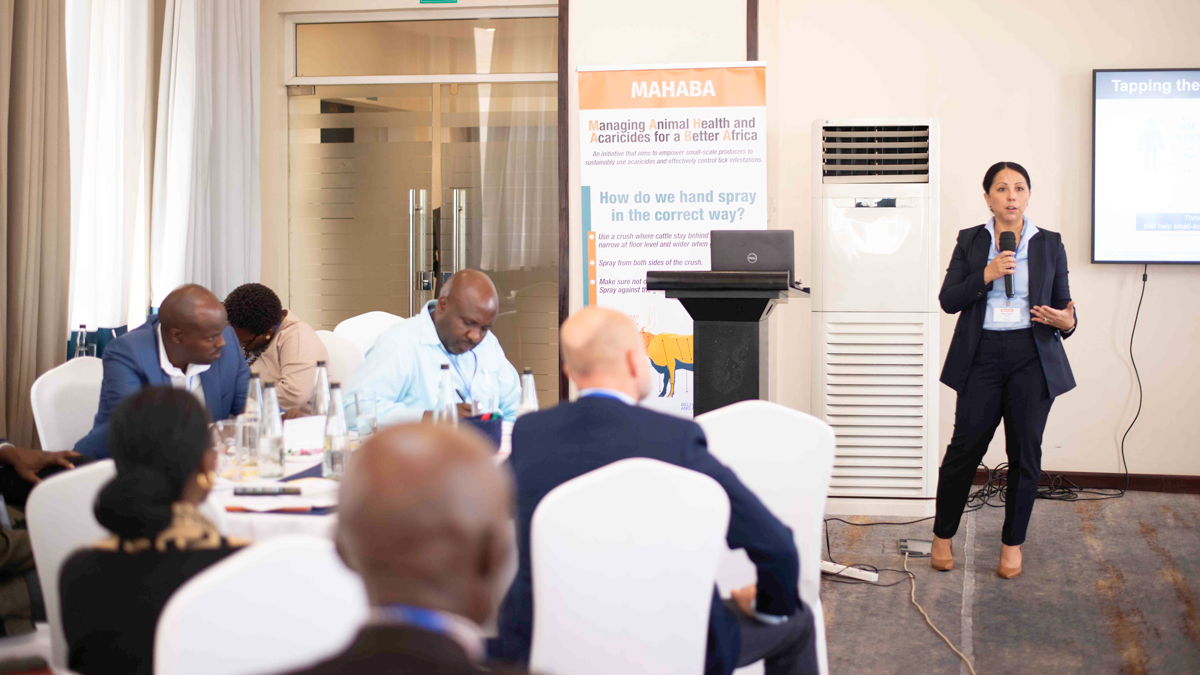Maria Chavez, Advisor – Shared Value, explains why collaboration is critical for sustaining the livelihoods of cattle keepers in Uganda.
Approximately 2.3 million households in Uganda depend on cattle for their livelihoods1. Up until 2012, when increasing losses due to tick-borne diseases (TBDs) were reported2, cattle and dairy development in Uganda was a success story. But with the rise of TBDs, research by local authorities revealed that acaricide application practices by small-scale livestock producers (SSPs) were contributing to the problem.
In 2022, in partnership with GALVmed and with support from the Bill & Melinda Gates Foundation, we launched Managing Animal Health and Acaricides for a Better Africa (MAHABA) – an initiative to help address this issue by bringing a comprehensive product portfolio to farmers in Uganda and Nigeria, alongside training initiatives focused on addressing the resistance of ticks to acaricides. MAHABA provides education to help local farmers successfully manage ticks and the impact of tick-borne-diseases, while facilitating significant livestock productivity gains.
At a meeting of MAHABA stakeholders last December in Kampala, Uganda, it became evident that collaborations and partnerships are necessary to reverse the trend of tick resistance to acaricides.
Stakeholders agreed to work on five key intervention pillars for sustainable tick and acaricide management:
- Sensitization and training of field personnel and farmers to enhance their understanding of effective tick control measures
- Establishment of a multi-stakeholder platform for ongoing engagement and collaboration
- Strengthening diagnostic infrastructure and capacity to test for tick resistance and other animal health related issues
- Facilitating access to affordable financing for farmers to acquire tailored acaricide application equipment through credit and saving institutions owned by farmers groups (SACCOS)
- Review of existing policy for tick and TBD control and implementation in the country
Elanco is conducting face-to face training for SSPs and animal health professionals, and in 2024 launched a user-friendly mobile app called Tick Academy™ to help users combat tick infestations under an Integrated Tick Control Approach. These efforts will contribute to local productivity and improved livelihoods for SSPs. But additional partnerships can help us go even further by leveraging trainings and supporting the development and delivery of vaccines, sustainable cattle breeding and diagnostics to help tackle tick resistance.
At Elanco, we are constantly looking for new ways to collaborate across sectors – keeping healthy animals central to global sustainability objectives today and tomorrow. This is in alignment with the United Nation’s Sustainable Development Goals, which recognize that by working collectively with all stakeholders – including farmers, companies, governments and civil society –we can make an impact greater than the sum of its parts.
Find more about our global approach to ESG and sustainability – Elanco’s Healthy Purpose: Sustainability (elanco.com).
1. Uganda Bureau of Statistics. National Livestock Census 2021. Abridged version. Accessed on April 2023 on https://www.ubos.org/wp-content/uploads/publications/National-Livestock-Census-2021-Abridged-Version.pdf
2. National Drug Authority. Ectoparasiticides and the challenge of Tick resistance. Accessed on June 2022 on https://www.nda.or.ug/ectoparasiticides-and-the-challenge-of-tick-resistance/
Maria Chavez
Shared Value Advisor

